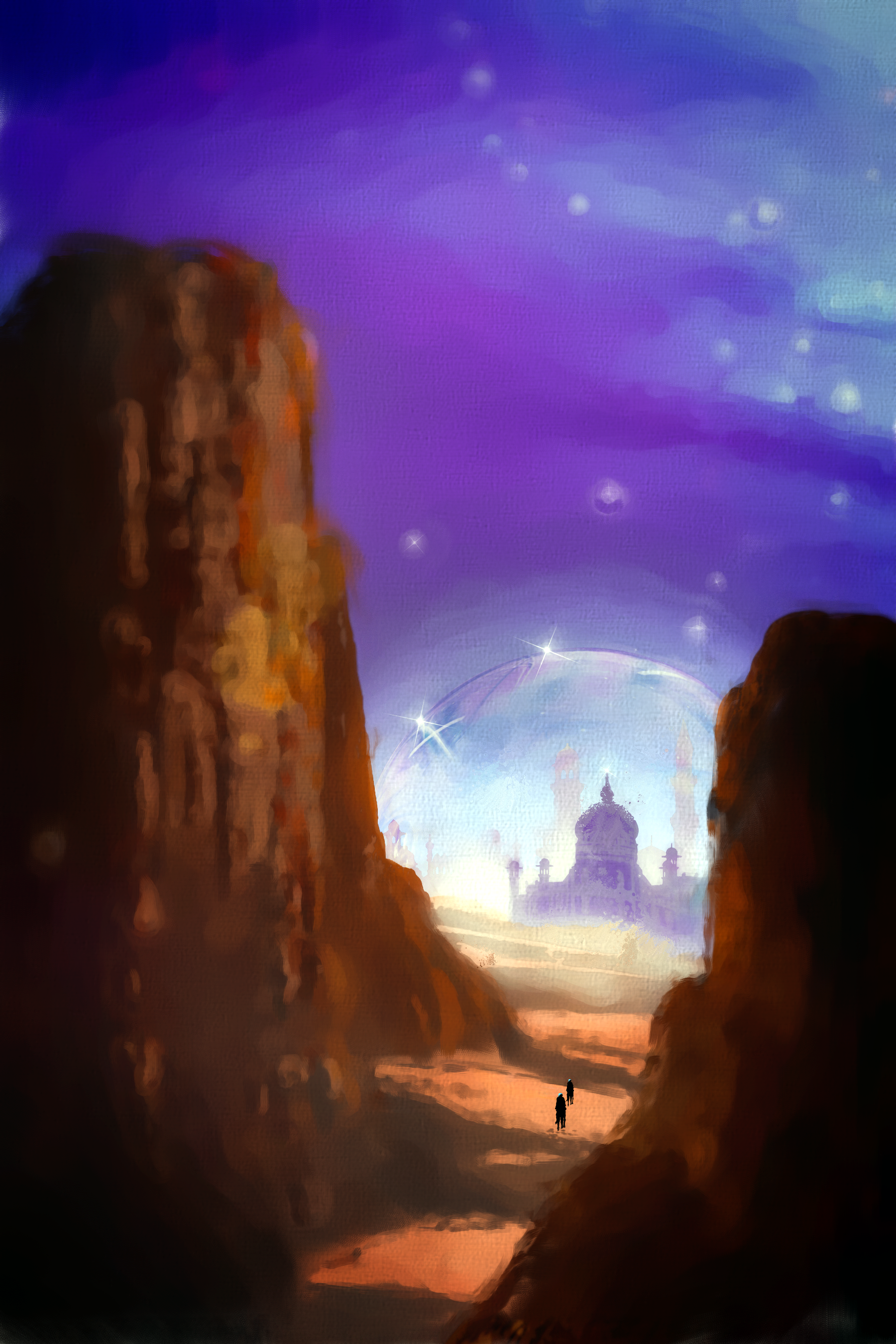We had so many wonderful stories:
- AKA Jane Museum by Lane Robins
- An Equivalent Exchange by Jamie Hawley
- Just Fooling by Lisa Timpf
- The Delivery by Meenakshi Bhatt
- The Malicious Time Traveller's Dinner Party by Nigel Brown
This story’s first line came to me during a free write and remained unchanged throughout revision. I set out to write a story about a dragon falling in love with a human, but the thing I’m most proud of is the way this story highlights the many forms love can take, including a love of music, a love of collecting, and a love for our community, even after that community is no longer with us. I hope the story serves as a reminder that we can’t shoulder our burdens alone; by sharing our grief, we not only lighten the load, but we also grow closer with those around us. (The other reminder is this: when in doubt, listen to The Mountain Goats.)
Interesting! Thanks, Jamie! Be sure to check out "An Equivalent Exchange" and the rest of the stories now!
Thank you, readers!
We hope you enjoy this issue as much as we did.
The Time Machine by H.G.Wells (1895) is probably one of the most famous sf stories published, certainly one of the first, and remains my favorite sf story of all time. The core of the story doesn't concern time travelling, which Wells uses as a science-fictional device, but Darwin's Theory of Evolution. Darwin's On the Origin of Species... had been published in 1859, just 36 years before The Time Machine saw print, and Wells explored its implications for the human species using pioneering sf techniques that were a bombshell to the Victorian mind. When writing, I sometimes have trouble with titles, but in this case the title of my story came first: "The Malicious Time Traveller's Dinner Party" just popped into my head. Soon I realised that the 'Time Traveller' of the title was THE 'Time Traveller', Wells's own. From then on, the story wrote itself.
From movies, books and fiction of the day, we're familiar with the Late Victorian world of the 1890s, and my story is peppered with references that link to Wells's own life. I had the advantage, as well, in that the drapery store that Wells suffered to work in as a teenager, and that he later wrote about in his book The History of Mr. Polly.(1910), was located in the neighborhood where I grew up, in Southsea, in Southern England. By my day, sadly, it was long gone, but the elegant Victorian and Edwardian villas still remain, and retain in that part of Southsea the genteel air of Wells's time.
Interesting! Thanks, Nigel! Be sure to check out "The Malicious Time Traveller's Dinner Party" and the rest of the stories on November 30, 2024!
I always thought I would write cosy and comforting stories since those are the stories I gravitate towards as a reader. Yet every time I sit down to write a story, something chilling always seems to find its way into it.
This story started with a dream I had. The only thing I remember about the dream was the sight of lions prowling on a road. In the dream, I was driving a car. As I reached the top of a particularly high ascent in the road, the lions suddenly became visible as I looked down at the road ahead. I woke up shaken. The rest of the story grew from the sense of menace and terror that I felt.
Interesting! Thanks, Meenakshi! Be sure to check out "The Delivery" and the rest of the stories on November 30, 2024!

Over the past year, I’ve been writing a number of flash-length fiction pieces, which is a new endeavor for me. Sometimes when I write short fiction in the 5,000-ish word range, I end up getting too convoluted. Flash fiction helps me keep it simple, and challenges me to use words economically. This is a skill that hasn’t always come easy. In one of my high school English classes, we had to condense written articles of several paragraphs into something much shorter, which challenges you to figure out what the main points are. I really struggled with this sometimes, and would grumble to my friends (in a rather animated fashion) about how much I disliked these exercises. Now, though, I’m grateful!
Interesting! Thanks, Lisa! Be sure to check out "Just Fooling" and the rest of the stories on November 30, 2024!
In the meantime, the slush pile is already building up for the notable November issue. (Thank you for submitting!) We better get to work...
Thank you, readers!
We hope you enjoy this issue as much as we did.
This story emerged pretty much entirely as is, from the beginning to the end, during a day-long work meeting. I was taking notes in a notebook, and suddenly thought... What if a zombie was a computer programmer? Add in my interest in obscure brain dysfunctions, and there it was!
The worst part, though, was coming up with a title, until I remembered that zombie processes are a thing in Unix-based operating systems. Once I had that, the story was complete. I am so happy that this story has found a good home!
Some writers are plotters (they work out the story details in advance). Others are pantsers (they write by the seat of their pants and develop the story as they go along). I'm a pantser.
"The Dragon Shepherd" started when I visualized a dragon roasting over a fire, with men sitting around it.
I needed conflict so I added a girl walking up to them and saying, "That's mine."
The characters grew out of the dialogue between them. As the characters grew, I discovered why they were there and where they came from.
Then I needed an ending. This is where plotters have an advantage because they know the ending before they begin.
Endings are important!
Since I didn't, I went through a process of trial and error to think of an ending that made sense and yet was (hopefully) a surprise.
And I wanted the ending to be satisfying to the reader. Unless it's a horror story, the sympathetic character(s) should come out ahead.
Then I filled in the gaps in between, and voila, I had a story.
On to the next one!
Without further ado, let's take a sneak peek at the piece:

What this means for authors: you should be hearing from us very soon if you haven't already. Please check your spam/junk folders! Authors that get good news will also get a contract. Please send this back ASAP so we can start editing your story.
It's odd. We often get similar stories in an issues's hold-for-voting. This time, for example, we had two very nice zombie stories. But we can't publish more than one zombie story in an issue, so one had to go. :(
Authors are often unaware of such concerns.
I better get back to work on the new issue! Soon, I'll start bragging about the new issue in this very spot!
In the meantime, good luck with your writing!
The most important deadline for writers is our submission deadline of July 15, 2024. Get those stories in!
Good luck!
Thank you, readers!
We hope you enjoy this issue as much as we did.
I've always loved dragons, ever since I first picked up a copy of Dragonsong by Anne McCaffrey. At some point I started to develop my own idea of what dragons are - less lizard and more air elemental, great spirits of magic and mystery. These dragons are hoarders, true, but also curators and archivists; their collections are specific and lovingly tended. They are shapeshifters, and choose to be somewhat humanoid in their dealings with humans, as that is more convenient for whatever meddling they want to get up to. They bring magic into the world by their very existence (in much the same way that good stories do).
Of course, dragons are their own mythology, and they are regarded differently throughout the world. In western folklore they are often seen as terrible beasts who steal virgins and burn crops and eat livestock. In eastern folklore they are more likely to be friendly or helpful spirits. In either case they come into the epic tale, bringing a might and magesty that you don't find with pixies or dryads or even unicorns, for the most part. Dragons have bigger tails, erm, tales. The Aurelian is a creature of epic battles, mischief, and an age of history beyond human scope... and yet she dips a wing into this handful of pages about Rukmini, who wants nothing more than a peaceful life as a librarian and researcher.
Stories, like dragons, can shift their shapes unexpectedly. But as humans, especially as authors, we also have choices in how we shape our own stories, whether we tell them as epic adventures or quiet reflections. We may not always control the narrative, but we can choose our focus, and sometimes the details we latch onto make all the difference between tragedy or comedy, laughter or tears, loss or learning. May you curate your library brilliantly, whatever shape your stories take.
“Gilmore” is essentially the product of a good prompt gone bad. I was participating in the NYC Midnight 500-word micro-fiction challenge, and the prompt called for a comedy that involved a dozen eggs and washing a dog. I immediately thought of how washing my own dogs is a chore—for all of us—and how, at times, I could swear they time their shaking to get me the most soaked. As a writer who is most comfortable in the speculative world, the idea came to set the story in a post-apocalyptic world on a spaceship. The narrator’s voice flowed somewhat naturally in my head, and I saw him surrounded by all these animals with differing personalities and idiosyncrasies. And then I thought, “The animals MUST be in charge. Because, truly, we are doing a crap job taking care of this planet.” Over time, I expanded the story from its original 500-words but still saw it as a flash piece. I have ideas for additional short pieces about these characters and this world. Maybe even a novel down the road. Who knows? Here’s to Laika and her revenge!

We had an interesting discussion at the meeting about tone. You may or may not have noticed the tone of Electric Spec. If not, feel free to read some of our many FREE stories! The bottom line is: Electric Spec has a specific tone and it is not Grimdark. In fact, it might be the opposite of Grimdark! Anyway, different markets have different tones.
Please submit your art appropriately--for your best chance of success!
We'll start blogging about the new issue soon. Stay tuned!
Next week I'll tell you what happened at the Production Meeting.
We are reading the stories in the slush pile. Different editors have different processes. Some like to read a few stories every week. At the opposite extreme, some like to power through many stories in one sitting. Obviously, in the first scenario each story gets a lot of individual attention. In the second scenario, it's easier to compare stories with one another. In all scenarios your story will have a better chance if it grabs the reader right away.
Of course, editors have their own idiosyncrasies. Personally, I'm not excited about stories over 5,000 words because they're extra work for us in terms of editing and formatting, etc. Each editor enjoys different genres. I enjoy time travel tales and quantum fiction. But, don't worry, we all enjoy good stories.
Bottom line: if you submitted a story: Thank You! And Good Luck!

Many of the Electric Spec editors have been, or are, members of Rocky Mountain Fiction Writers (RMFW).
We are excited about the 2024 anthology "Without Brakes, Fingers Crossed" which will be published September 7, 2024 and will include a story by the fabulous Paolo Bacigalupi!
Read all about it on the March 8 RMFW blog,
A woman walks into a bar in New Taichung, Callisto…
Mirjana settled in at the Jammed Neck Ring, where a human bartender served. His braided red-blonde beard reached his belt. As she sat, he asked, “Perhaps you would like to try Quevedo Reposado Tequila?”
A group of New Mexico professional SFF authors, under the banner of Turquoise Apocalypse, meet once a month to critique. The quote above is from my novel that’s currently in search of a literary agent, but when it was under critique, Rebecca Roanhorse (Between Earth and Sky Trilogy) took issue with the scene above. “Would they really have tequila on the moons of Jupiter?”
Fair point. Tequila is made from blue agave, which takes an average of ten years to mature before it can be harvested for tequila production. It needs mineral-rich soil and a semi-arid climate that’s not excessively hot. The highest quality blue agave is grown in the state of Jallisco, Mexico where the altitude is around 5,000 feet, a major contributor to the necessary mild clime.
So, Rebecca had inspired me to write about the fictional Quevedo dynasty: centuries-long growers of agave and distillers of tequila. And Liquor Royalty. In the background of “Family Roots, Family Thorns,” the Quevedo family packed up the business when Earth’s climate made growing agave naturally beneath the skies impossible. Instead of going underground with climate-controlled greenhouses to scratch profit from a dwindling earth market, the Quevedos struck out for the Outer, where the market was untapped. Some genetic tweaking with the agave gave it maturity in two years.
And so the story begins with trouble in the dynasty, when the father chooses an heir to the fortune. And genetic engineering isn’t confined to the crop. It's employed in bizarre and contemptible ways during this brother-against-brother family war. And the effects stretch beyond what either brother predicted.
So, enjoy a shot of Quevedo Tequila, “…a little sunshine makes all the difference.”
Thank you, readers!
We hope you enjoy this issue as much as we did.
Back when I was in college, I studied French. Now that I've been out of college for a number of years, I wanted to pick up the language again. There's a magazine that specializes in easy articles in French for native English speakers. Each issue focuses on a specific region of France or overseas French territory. One issue focused on Réunion, an island in the Indian Ocean. It featured an article about the postal carriers. Because Réunion is so remote, the mail carriers there walk their entire routes, almost a hundred miles a week.
I found this fascinating. The article focused both on the rigors and dedication of the postal carriers as well as the natural beauty of the land and the connection the carriers have to the people they serve. Me being me, I immediately thought of Fairy and what a postal carrier in some of the wilder regions of Fairy might encounter. I also remembered the dedication of my local postal workers during the pandemic. I wanted to honor them with something a little lighter, because many of my stories focus on heavier topics such as loss or loneliness. I'm pleased with how "Neither Snow nor Rain nor Gloom" turned out.
Without further ado, let's take a sneak peek at the piece:

So, anyway one of our editors is currently working with one of our authors on a story ending. We'll see what they come up with...
What's your preference for a story ending?
Authors should hear back from editors with a yay or nay this week. (Many of these emails have already gone out.) Please check your spam or junk folders. If you got an acceptance, please email us back ASAP because the February issue has a short turn-around. Once we hear back, we will start editing stories. This may involve multiple back-and-forths with authors.
After we get a final story version with the author, the story still has to go for proofreading. And, then, we pass the story off to the tech team.
We also add the authors' and artist's bios to the website and write the Letter from the Editors. And hopefully, we'll get some fun blog entries to post right here later in the month.
If everything goes smoothly, the authors and artist will get paid on February 27, 2024. We will publish on Feb 28--we haven't missed a deadline yet!
Check back here next week for more info about the fun new issue!
In the meantime, here are some takeaways from our recent slush pile...
The submission period for the fabulous February 2024 issue of Electric Spec has passed. If you submitted: Thank You!
The editors are all hard at work doing their reading. Stay tuned for more info later in the month.
Stay warm!